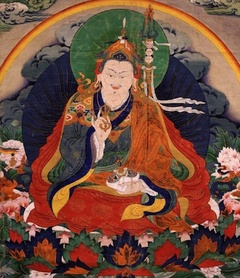
Guru Padmasambhava
Yearning Song of Prayer to Invoke the Wisdom Mind of the Compassionate Teacher Padmasambhava
by His Holiness the Fourteenth Dalai Lama
མཐའ་བྲལ་དོན་དམ་འོད་གསལ་གཉུག་མའི་གཤིས། །
tadral döndam ösal nyukmé shi
The absolute, which is beyond all limits and extremes is the fundamental nature of clear light,
ལྷུན་གྲུབ་མཚན་དཔེའི་གཟི་འབར་ལོངས་སྤྱོད་རྫོགས། །
lhündrub tsenpé zibar longchö dzok
The perfect sambhogakāya is resplendent with the spontaneously present major and minor marks,
འགྲོ་ཁམས་ཇི་བཞིན་སྣ་ཚོགས་སྤྲུལ་པའི་སྐུ། །
dro kham jishyin natsok trulpé ku
And the nirmāṇakāya manifests in various forms to suit the different characters of beings—
ཐུབ་དབང་ཐུགས་རྗེ་རྒྱ་མཚོས་དུས་ཀུན་སྐྱོངས། །
tubwang tukjé gyatsö dü kün kyong
You who are the mighty Lord of Sages, guard us at all times with your infinite compassion!
རྒྱལ་ཀུན་མཁྱེན་བརྩེ་ནུས་པའི་སྒྱུ་འཕྲུལ་གར། །
gyal künkhyen tsé nüpé gyutrul gar
As the miraculous display of the wisdom, love and power of all the victorious buddhas,
པུར་རྒྱལ་བོད་ཀྱི་འགྲོ་བའི་དཔལ་ཤར་བ། །
pur gyal bö kyi drowé pal sharwa
Glorious and resplendent, for all living beings in the land of Tibet, you appeared,
གྲུབ་མཆོག་མཚོ་སྐྱེས་རྡོ་རྗེ་དྲིན་པོ་ཆེ། །
drub chok tsokyé dorjé drinpo ché
Supremely accomplished and gracious master, Lake-born Vajra (Tsokyé Dorje)—
དེང་འདིར་གདུང་བས་བསྐུལ་ལོ་ཐུགས་རྗེས་ཟུངས། །
deng dir dungwé kul lo tukjé zung
Now we cry out to you with this, our heartfelt plea: hold us in your compassion!
སྤངས་རྟོགས་མཐར་ཕྱིན་སྐུ་ལྔའི་བདག་ཉིད་ཀུན། །
pang tok tarchin ku ngé daknyi kün
Embodiments of the five kāyas, those who have reached perfect realization and abandonment,
མཉམ་ཉིད་ཉེ་རིང་གཟིགས་པ་མི་མངའ་ཡང༌། །
nyamnyi nyering zikpa mi nga yang
View all with equanimity, and are entirely beyond all forms of partiality;
གདུལ་བྱའི་ཁམས་སོགས་རྟེན་འབྲེལ་མཐུ་བཙན་པས། །
duljé kham sok tendrel tutsenpé
Even so, as a result of interdependent factors, such as the temperaments of beings,
ཁྱོད་ནི་གངས་ལྗོངས་འགྲོ་བའི་མགོན་དཔུང་ཉིད། །
khyö ni gangjong drowé gön pung nyi
You came to be the lord and protector over all who live within the Land of Snows.
ལྷག་པར་ཁྲི་སྲོང་ལྡེ་བཙན་ཡབ་སྲས་ཀྱིས། །
lhakpar tri song dé tsen yabsé kyi
In particular, when King Trisong Detsen and his son, the prince,
བོད་ཁམས་ཐུགས་རྗེས་འཛིན་པར་བསྐུལ་བའི་ཚེ། །
bö kham tukjé dzinpar kulwé tsé
Urged you to care for the land of Tibet with your compassion,
འགྱུར་མེད་ཞལ་བཞེས་མཛད་པ་དོན་གནས་ན། །
gyurmé shyalshyé dzepa dön né na
You gave them your word, your unfailing pledge, that you would always work for our benefit,
དུས་འདིར་ཁྱོད་ཀྱིས་ཐུགས་རྗེས་སྐྱོང་བར་གསོལ། །
dü dir khyö kyi tukjé kyongwar sol
And so now we call upon you: care for us with your compassion!
ཕོངས་ཤིང་དོན་མེད་བཀོལ་སྤྱོད་གདུང་བས་མནར། །
pong shing dönmé kolchö dungwé nar
Destitute, forced into meaningless and worthless labours and reduced to misery,
སྙད་སྡང་སྲོག་ལ་འཇིགས་པའི་དངངས་སྐྲག་གིས། །
nyé dang sok la jikpé ngang trak gi
The people live in constant fear of accusation, violence and other threats to life,
གཤིན་རྗེའི་གྲོང་ཁྱེར་ལྟ་བུར་གྱུར་པ་ཡི། །
shinjé drongkhyer tabur gyurpa yi
And the land itself has become like the terrible realm of Yama, Lord of Death—
ཆོས་ལྡན་གངས་ཅན་པ་རྣམས་ཅི་ཡིས་ནོངས། །
chöden gangchen pa nam chi yi nong
O Dharma practitioners of the Land of Snows, where did we go wrong?
འོན་ཏེ་སྔོན་བསགས་དཀར་མིན་ལས་ཀྱི་འབྲས། །
önté ngön sak kar min lé kyi dré
As a result of the impure actions we have committed in the past,
བརྣག་དཀའི་དུཿཁ་བཅུ་ཕྲག་ཟུང་ལྷག་ལོར། །
nak ké duh kha chu trak zung lhak lor
For decades now, we have endured so many sufferings, hard to even think about,
མྱངས་པའི་ཉམ་ཐག་ངང་ཚུལ་འདི་བས་ན། །
nyangpé nyamtak ngang tsul diwé na
And we are worn down by all our experiences—such is our plight, our desperate situation.
ལྷག་པར་དགོངས་ཤིག་བརྩེ་ཆེན་ཐུགས་རྗེའི་གཏེར། །
lhakpar gong shik tsé chen tukjé ter
Now we call out to you: look upon us with your special care, you who are a treasury of love and compassion!
ཨེ་མ་དཀར་མིན་ལས་ཀྱི་མཐུ་བཙན་མོད། །
ema kar min lé kyi tu tsen mö
Alas! The force of negative actions is powerful indeed!
དད་དང་འདུན་སྟོབས་ལྷག་བསམ་བྱིན་མཐུ་ཡང༌། །
dé dang dün tob lhaksam jin tu yang
Yet do not faith, positive intentions, concern for others and the force of blessings
སྟོབས་དང་ལྡན་ཕྱིར་དགེ་འབྲས་འདོད་རྒུའི་ཚོགས། །
tob dangden chir gé dré dögü tsok
Also have their power? So help us now to create the right circumstances,
མྱུར་དུ་སྨིན་པའི་རྟེན་འབྲེལ་མཐུ་འགྲུབ་མཛོད། །
nyurdu minpé tendrel tu drub dzö
In which our virtues will swiftly bear their fruit and bring us the fulfilment of our wishes!
བླ་མ་མཆོག་གསུམ་བོད་སྐྱོང་དམ་ཅན་དང༌། །
lama chok sum bö kyong damchen dang
Through the power and blessings of the Guru, the Three Jewels and all the oath-bound guardians of Tibet,
གངས་ཅན་སྐྱེ་རྒུའི་དད་དམ་བྱིན་མཐུའི་སྟོབས། །
gangchen kyegü dé dam jin tü tob
Together with the force of the devotion and commitment of the people of this Land of Snows,
སྣང་སྟོང་རྒྱུ་འབྲས་མི་བསླུའི་བདེན་སྟོབས་ཀྱིས། །
nangtong gyundré mi lü den tob kyi
And the strength of the infallible truths of cause and effect, appearance and emptiness,
སྨོན་པའི་དོན་རྣམས་མྱར་དུ་འགྲུབ་པར་ཤོག། །།
mönpé dön nam nyar du drubpar shok
May all our deepest wishes and aspirations swiftly be fulfilled!
ཅེས་སློབ་དཔོན་ཐུགས་རྗེ་ཅན་གྱི་ཐུགས་དམ་གནད་བསྐུལ་གདུང་དབྱངས་གསོལ་འདེབས་འདི་ནི་ལྕགས་སྤྲེ་སྤྲེལ་ཟླ་ཚེས་བཅུའི་དུས་ཆེན་སྐབས་བཀའ་ཤག་དང༌། ཆོས་དོན་ལྷན་ཁང་ནས་བསྐུལ་མ་བྱུང་བའི་ཐོག དུས་འདིར་གངས་ལྗོངས་ཀྱི་ཆོས་མིན་ཕྱོགས་རྣམས་བརྩེ་ཆེན་ཐུགས་རྗེས་འདུལ་བར་སློབ་དཔོན་ཆེན་པོ་ཉིད་ལ་གསོལ་བ་འདེབས་པ་གནད་དུ་མཐོང་ནས་ཤཱཀྱའི་དགེ་སློང་བསྟན་འཛིན་རྒྱ་མཚོས་དད་གདུང་དྲག་པོས་གོང་ལོའི་ཟླ་ ༡༠ ཚེས་ ༡༤ ལ་སྨོན་པའོ།། །།
This “Yearning Song of Prayer to Invoke the Wisdom Mind of the Compassionate Teacher Padmasambhava” was composed in response to requests made by members of the Cabinet (kashag) and the Department of Religious Affairs on the tenth day of the monkey month in the year of the Iron Monkey (1980). I, the buddhist monk Tenzin Gyatso, also saw the need for a prayer such as this, to the great Master Padmasambhava, in order to overcome those forces opposed to the Dharma within the Land of Snows by means of compassion and love, and so I made this prayer of aspiration on the 14th day of the 10th month of the same year with intense faith and longing.
| Translated by Adam Pearcey, 2005